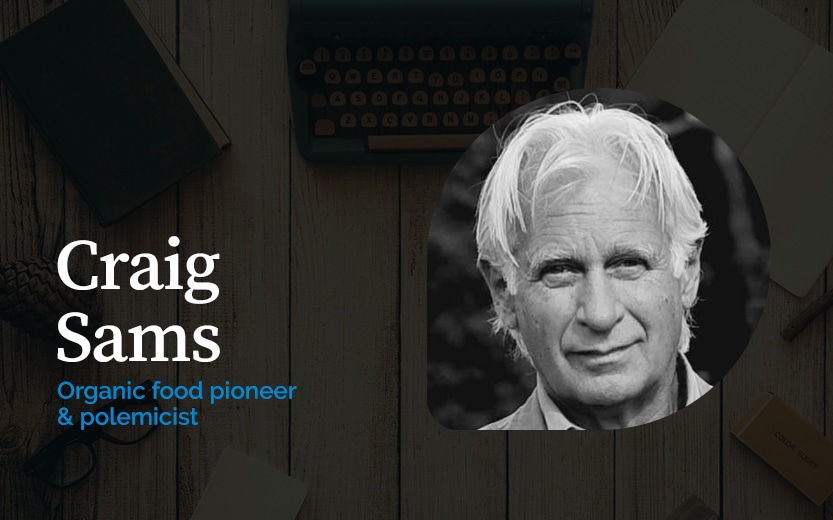Water trumps everything. Water is food. But the worldwide well is running dry. Only organic can rescue our desiccated planet, says Craig Sams
In March I attended the City Food Lecture at Guildhall. This is a glitzy event where the City livery companies (Fruiterers, Grocers, Poulterers, Butchers, Fishmongers) lay on a lecture and discussion and canapés. The speaker this year was Peter Brucke, CEO of Nestle. The discussion was chaired by Sheila Dillon of Radio 4’s Food Programme.
Peter Brucke’s theme was water. He outlined how diminishing water resources are beginning to impinge on food production. It’s quite a story. He told us what was wrong but failed to mention how it all went wrong.
First the story – all over the world, in the US Midwest, in China, in Punjab, in Saudi Arabia there are massive underground lakes that have accumulated water for thousands or millions of years. They just sat there until the last 50 years, quietly just being water. Then they got pumped to the surface and now they’re exhausted, empty, pumped out, kaput. We’re back to relying on rain – just when climate change is making rain more unpredictable than it’s ever been.
How did this happen? Well, companies like Nestlé encouraged backward farmers to modernise, to use chemical fertilisers and adopt the high yielding wheat and rice varieties of the Green Revolution. Chemical fertilisers trigger a breakdown in soil organic matter. Any farmer who has converted degraded soil into productive organic soil can tell you that it can take quite a few years before that soil holds water and nutrients and has the biological resilience that protects plants from fungal and other diseases. Any fool can go turn rich farmland into degraded semi-desert but it takes skilled husbandry to recover what is lost.
Soil that is depleted of organic matter doesn’t hold water. Dave Vetter, who farms organically in Nebraska, uses just one seventh of the water that his non-organic neighbours use – they put on the chemicals, add water they pump up from the nearly exhausted Ogalalla aquifer and it mostly just drains off the land, into the Missouri River, down to the Mississippi and into the Gulf of Mexico at New Orleans. What a waste! What’s worse, there is no life in the sea for 200 miles off the coast of New Orleans because the nitrates and other chemicals are so intensely concentrated. The shrimp boats aren’t coming anymore. The same is true in India, where farmers add more chemicals every year and get diminishing returns. Their water is running out, too. The Saudis have started to buy land in Africa, their own investment in farming worked out for about 20 years, now the water’s gone.
Sitting at the high table, flanked by bottles of their San Pellegrino, Nestle’s boss lamented the situation but avoided the only answer that makes any sense. Go organic. Everyone still worries about the cost. But the externalised cost of degraded soils, water depletion and crop failure is a lot more than tuppence on the price of a Milky Bar. It’s war, famine, disease and death – our old friends the Four Horsemen of the Apocalypse.
“Everyone still worries about the cost. But the externalised cost of degraded soils, water depletion and crop failure is a lot more than tuppence on the price of a Milky Bar”
China got to grips with a dried out dust bowl in Heilongjiang Province back in 2001. The Beijing bosses told the local boss to stop letting the dust from dried out fields blow all over the place. The Heilonjiang apparatchiks ordered that 1,500,000 hectares convert to organic within 10 years. Bang on schedule, in 2011, the last 150,000 hectares went organic and China now rules the market for organic commodities like sesame, pumpkinseed, aduki beans, sunflower seeds, etc etc. And the dust clouds are a distant memory.
Of course we can’t just order that sort of thing in our representative democracies. We have to fight our way past agribusiness lobbyists in Brussels who have a mysterious grip over the better judgement of EU Commissioners for agriculture. The CAP is rotten to the core. The USDA is little better. But when companies like Nestle start ringing the alarm bells, then companies like Monsanto, Syngenta and the nitrate fertiliser merchants will have to run for cover.
Water trumps everything. Water is food. The old soul tune says you don’t miss your water till your well runs dry. Well, it’s running dry and there’s only one way to fix that. Organic farming – the only way to deal with a dried out planet.
• Craig Sams will talking on the themes raised in his two most recent NP blogs in ‘No Place to Hide: The Future of Food in the New Age of Transparency’. The talk takes place at Olympia, London at 10.30-11.15 on Monday April 8 – visit www.naturalproducts.co.uk for more information.
 By Craig Sams
By Craig Sams
Organic food pioneer and polemicist
Craig Sams is Britain’s best known natural food pioneer. He is the founder of Green & Blacks, a former Soil Association chairman and the author of The Little Food Book.











